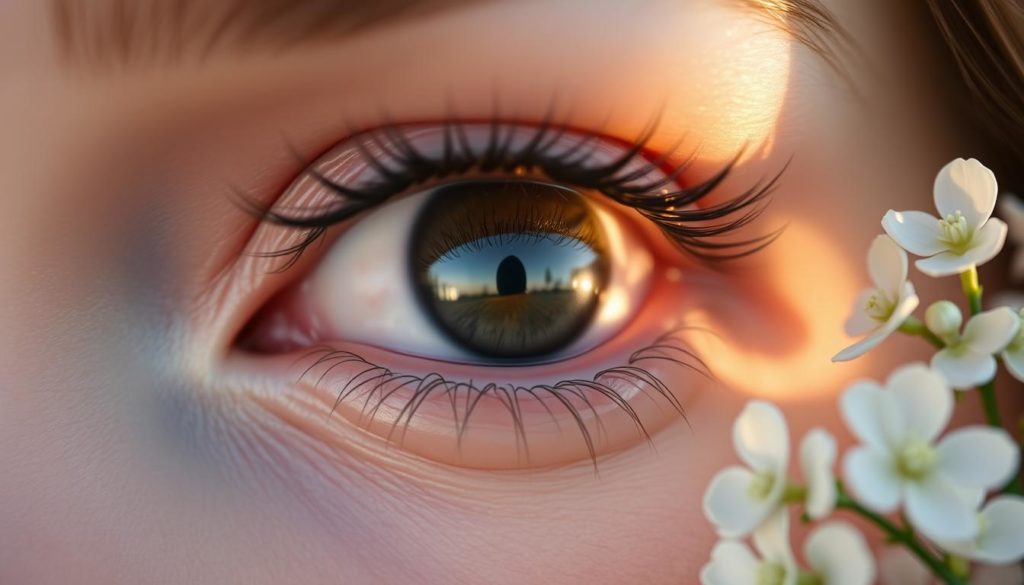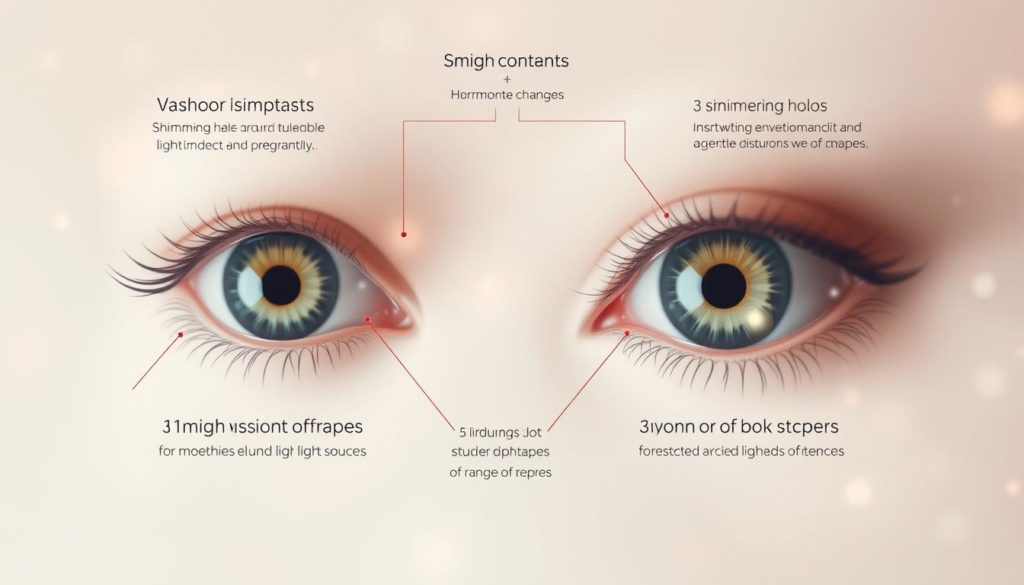Did you know up to 15% of pregnant women see changes in their vision? This fact is surprising and not well-known. It shows how pregnancy affects eye health through hormonal changes. Knowing about pregnancy vision problems can help you deal with these changes better.
In this article, we’ll explore why vision changes happen, the symptoms to look out for, and how to keep your eyes healthy. Even though vision changes can be scary, knowing what to expect can make you feel more secure and prepared.
Let’s start this journey to learn more about how pregnancy affects vision.
Understanding Pregnancy and Vision Changes
Pregnancy changes a woman’s body in many ways. One surprising change is in vision. Hormonal shifts and fluid retention can affect eyesight.

What Causes Vision Changes During Pregnancy?
Several factors can change vision during pregnancy:
- Hormonal fluctuations: Hormones like estrogen and progesterone can change eye tissues, affecting vision.
- Fluid retention: More fluid in the body can change the eye’s shape, causing blurry vision.
- Gestational diabetes: This condition can harm the retina’s small blood vessels, leading to vision problems.
Common Symptoms of Vision Changes in Pregnancy
Women may notice different vision changes during pregnancy. These include:
- Blurriness: Fluid changes can make the cornea and lens blurry.
- Dry eyes: Hormonal changes can reduce tear production, causing dryness and discomfort.
- Temporary vision impairment: Some may see mild to moderate vision issues that go away after giving birth.
- Sensitivity to light: Increased light sensitivity is another common symptom.
Hormonal Changes and Eyesight
During pregnancy, hormonal changes can affect your vision. The main culprits are changes in estrogen and progesterone levels. Knowing about these changes can help you deal with vision problems during pregnancy.

How Hormones Affect Your Vision
Hormonal shifts in pregnancy can cause vision symptoms. High levels of estrogen and progesterone can make your lens and cornea hold more fluid. This makes your vision blurry. These changes can also alter the shape and thickness of your cornea, affecting your eyesight.
Dealing with Hormonal Impact on Sight
Managing vision issues during pregnancy requires both short-term and long-term plans. For quick relief, consider:
- Using lubricating eye drops to combat dryness
- Wearing glasses instead of contact lenses
- Ensuring adequate hydration
For long-term eye health, make sure to:
- Stay on top of routine eye exams
- Maintain a balanced diet rich in vitamins and minerals
- Consult with an eye care specialist if vision symptoms in pregnancy persist or worsen
By following these tips, you can manage the hormonal impact on your sight during pregnancy.
Common Pregnancy Eye Problems
Expectant mothers often face eye issues due to pregnancy. These problems are usually temporary and can be managed. Let’s explore some common eye problems during pregnancy:
Puffy Eyelids: Fluid retention in pregnancy can cause puffy eyelids. This is often harmless but might cause mild discomfort or blurred vision.
Sensitivity to Light: Hormonal changes can make you more sensitive to light. This increased sensitivity can affect your daily comfort and needs proper management.
Corneal Changes: Hormonal shifts can change the cornea’s shape and thickness. These changes might temporarily affect your vision.
Though these symptoms can be annoying, knowing their causes can help ease worries. The American Academy of Ophthalmology says these changes are normal and usually go away after pregnancy. Talking to your healthcare provider can help you navigate these issues smoothly.
Managing these eye problems during pregnancy is key to your eye and overall health. Regular eye exams and talking to your doctor can help manage these changes. This ensures your vision stays clear throughout your pregnancy.
Blurred Vision During Pregnancy
Blurred vision during pregnancy can worry you. But, it’s key to know when it’s just a normal part of pregnancy. And when it might mean something serious is going on.
When Blurred Vision is Normal
Blurred vision often comes from hormonal changes. These changes can make your eyes’ shape shift and cause fluid buildup. These issues usually go away after you’ve had your baby.
- Dry eyes
- Changes in corneal thickness
- Increased tear production
When to Seek Medical Advice
Even though many vision changes are okay, some can signal bigger health problems. If you see sudden and severe vision changes, get in touch with your doctor right away. Look out for:
- Persistent blurred vision
- Severe headaches
- Light sensitivity
These could point to serious conditions like preeclampsia or gestational diabetes. You need to see a doctor fast.
Eye Changes During Pregnancy: What to Look Out For
Pregnancy brings many changes to your body, including your eyes. It’s important to know about eye changes and vision symptoms during pregnancy. This helps keep your eyes healthy.
Red Flags for Vision Health
Some vision changes are normal during pregnancy. But, there are red flags that mean you need to see an eye specialist right away. These signs could point to serious conditions that need quick treatment.
| Symptom | Possible Concern |
|---|---|
| Severe Blurred Vision | Gestational Diabetes or Preeclampsia |
| Persistent Double Vision | Neurological Issues |
| Sudden Vision Loss | Retinal Detachment |
| Seeing Floaters or Flashes | Retinal Issues |
| Eye Pain | Infection or Inflammation |
If you notice any of these vision symptoms, see your healthcare provider right away. Early treatment can prevent serious problems. It keeps you and your baby safe and healthy.
Managing Pregnancy-related Vision Issues
Pregnancy can change your body in many ways, including your vision. Some changes might be short-term, but it’s key to know how to handle them. Looking into home remedies and professional advice can really help.
Home Remedies for Vision Problems
Drinking lots of water is important for your vision during pregnancy. It keeps your eyes moist and helps prevent dryness. Eating foods rich in Omega-3 fatty acids, like fish and nuts, is also good for your eyes.
Make sure to rest your eyes often and keep them clean. These steps can help with minor eye problems.
- Stay Hydrated
- Eat Omega-3 Rich Foods
- Rest Your Eyes Frequently
- Practice Eye Hygiene
Professional Eye Care Tips
Seeing an eye care professional is very important during pregnancy. They can give you specific advice and treatments if needed. Getting regular eye exams is also key to catch any big changes early.
- Consult an Eye Care Professional Regularly
- Follow Prescribed Treatments
- Ensure Regular Check-ups
Using both home remedies and professional advice can help manage vision problems during pregnancy. This way, expectant mothers can keep their eyes healthy.
Eye Care During Pregnancy
Keeping your eyes healthy during pregnancy is key for your vision and health. Knowing how pregnancy affects your eyes helps moms-to-be keep their sight sharp during this time.
Routine Eye Exams
Eye exams should be part of your prenatal care. These exams spot vision changes caused by hormones. Regular check-ups catch eye problems early, making them easier to handle.
Protecting Your Eyes
Protecting your eyes in pregnancy means making a few simple changes. Being mindful of things that could harm your vision is important. Here are some tips for keeping your eyes healthy:
- Wear sunglasses with UV protection outside.
- Drink plenty of water to avoid dry eyes, common in pregnancy.
- Limit screen time to avoid eye strain.
- Eat foods rich in omega-3s, vitamins A and E for eye health.
| Eye Care Tips | Benefits |
|---|---|
| Regular Eye Exams | Early detection and management of vision issues |
| Wearing Sunglasses | Protection from harmful UV rays |
| Staying Hydrated | Prevention of dry eyes |
| Limiting Screen Time | Reduction of eye strain |
| Balanced Diet | Support for overall eye health |
When to See an Eye Specialist During Pregnancy
Pregnancy can bring unexpected symptoms, including eye changes during pregnancy. It’s important to watch these changes closely. Knowing when to see an eye specialist visit is key for your health and your baby’s.
If you notice big eye changes during pregnancy like blurred vision or dry eyes, get help fast. These signs might mean you have a serious problem that needs quick attention.
- Consistent Blurred Vision: Some blurred vision is normal, but if it keeps happening or gets worse, it could be serious.
- Sudden Vision Changes: If your vision changes suddenly or badly, you need to see a specialist right away.
- Floaters or Flashes: These could mean you have a problem with your retina and should be checked quickly.
- Dry Eyes: If your dry eyes don’t get better with usual treatments, you should see an eye doctor.
Going for regular eye specialist visits is important. It helps keep an eye on any changes in your eyes during pregnancy. This way, you can stay healthy and catch any problems early.
| Symptom | Potential Issue | Recommended Action |
|---|---|---|
| Blurred Vision | Hormonal shifts or blood pressure changes | Schedule an eye specialist visit |
| Sudden Vision Loss | Possible retinal issues | Urgent consultation needed |
| Chronic Dry Eyes | Tear film abnormalities | Discuss with an eye specialist |
Being proactive about eye changes during pregnancy helps you get help early. If you notice any worrying symptoms, don’t wait to book an eye specialist visit.
Maintaining Eye Health for Moms-to-Be
Pregnancy brings many changes, and eye health is just as important as any other aspect of well-being. Hormonal changes can affect your vision, making eye care during pregnancy key. It helps manage temporary vision changes and supports long-term eye health.
Eating a balanced diet is a crucial step in eye health during pregnancy. Foods high in vitamins A, C, and E, and minerals like zinc and omega-3 fatty acids are vital. Leafy greens, carrots, berries, and salmon are great for your eyes. Drinking enough water also helps keep your eyes moist and reduces irritation.
Eye care doesn’t stop after pregnancy. Continue eating well and get regular eye exams to catch any lasting changes. Taking breaks from screens and bright lights can also help reduce eye strain. As a new mom, taking care of your eyes helps you care for your baby better.
By following these tips, you can manage vision changes during pregnancy and keep your eyes healthy long after. With the right eye care, moms-to-be can enjoy clear and comfortable vision throughout motherhood.
FAQ
What causes vision changes during pregnancy?
Hormonal changes, like more estrogen and progesterone, cause vision changes. These hormones can make your eyes retain water and change shape. They also reduce tear production, affecting your vision.
What are common symptoms of vision changes during pregnancy?
Symptoms include blurred vision, dry eyes, and light sensitivity. You might also have puffy eyelids or temporary vision loss. These symptoms are usually temporary and can be managed.
How do hormones affect your vision during pregnancy?
Hormones like estrogen and progesterone can make your eyes retain water. They also change the shape of your cornea. This affects how light is refracted in your eyes. Hormonal changes can also cause dry eyes.
How can I deal with hormonal impact on my sight?
Stay hydrated and use lubricating eye drops. Wear sunglasses to reduce light sensitivity. Getting enough rest also helps. If symptoms don’t improve, see an eye care professional.
What are some common pregnancy eye problems?
Common issues include dry eyes, puffy eyelids, and sensitivity to light. Changes in corneal shape can also occur. These problems are usually not serious and can be managed with simple remedies or a doctor’s advice.
When is blurred vision normal during pregnancy?
Blurred vision is normal due to hormonal changes and water retention. It often happens in the second and third trimesters. It usually goes away after childbirth.
When should I seek medical advice for blurred vision?
Seek medical advice if blurred vision is severe or accompanied by headaches, swelling, or rapid weight gain. Also, if you have persistent floaters and flashes, it could be a sign of a serious condition.
What red flags should I look out for in vision health during pregnancy?
Look out for sudden vision loss, persistent floaters, flashes of light, severe eye pain, or significant changes in eyesight. These symptoms need immediate medical attention.
Are there home remedies for vision problems during pregnancy?
Yes, use lubricating eye drops for dry eyes and cold compresses for puffy eyelids. Wear sunglasses for light sensitivity. Staying hydrated and getting enough sleep can also help.
What are professional eye care tips for pregnant women?
Have regular eye exams and use corrective lenses if needed. Eat a healthy diet rich in vitamins A and C. Avoid overusing screens and reading materials to reduce eye strain.
How important are routine eye exams during pregnancy?
Routine eye exams are crucial to monitor vision changes and catch early signs of serious eye conditions. They should be part of your prenatal care routine.
How can I protect my eyes during pregnancy?
Wear sunglasses with UV protection and use proper lighting when reading or working. Take regular breaks from screens and keep your eyes hydrated with lubricating drops.
When should I see an eye specialist during pregnancy?
See an eye specialist if you experience sudden vision changes, severe headaches, eye pain, or any other concerning symptoms. Regular check-ups are also recommended for your and your baby’s health.
How can I maintain eye health throughout my pregnancy?
Follow a balanced diet rich in vitamins, stay hydrated, and get plenty of rest. Wear protective eyewear and have regular eye exams. Postpartum eye care is also important for continued eye health.


